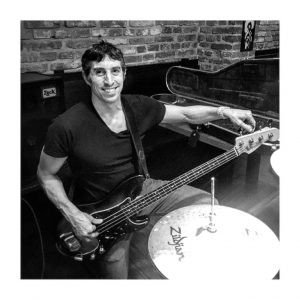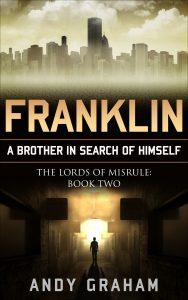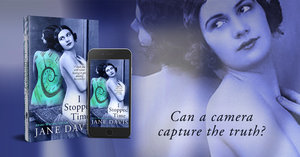Today I’m delighted to welcome Andy Graham to Virtual Book Club, the interview series in which authors have the opportunity to pitch their novels to your book club.
British author Andy was born and brought up on the fringes of Europe, and now lives in the heart of Europe – Prague. He says that he has too many interests for the hours of the day and a young family with too much energy to allow him to go grey peacefully.
He is a member of the British Blues Awards Hall of Fame, and has toured extensively across Europe, and occasionally beyond, playing bass guitar. He now does local gigs, work as an osteopath in the Czech Republic and sports massage teacher in the UK.
He writes political thrillers, dystopian fiction, creepy reads, and dark humour. His main series The Lords of Misrule is a dystopian political thriller for the 21st century. He also has a collection of 5 short ‘creepy reads’ available. Until the end of April, you can pick up the first two books of the Lords of Misrule FREE from his website.
“Part political thriller, part dystopian fiction, part tragic love story, Aijlan is a riveting page-turner of intrigue and suspense, loyalty and betrayal.”
Q: Andy, today we’ll be talking about Aijlan – The Silk Revolution, Book One of The Lords of Misrule. What is it that makes Aijlan particularly suitable for book clubs?
It’s topical, ambiguous, and not too long (around 55K words).
The book is a dystopian political thriller set in an alternate world very familiar to our own. There aren’t any ray guns, aliens or teenage girls struggling with their role as the Chosen One – that’s been done much better than I could. I’ve also tried to make it as balanced as a dystopian novel can be, rather than just a tale of them vs. us grievances.
The story draws on events that are dominating our current news: protectionism, centralisation vs. devolution of power, nationalism and religion. Though these elements aren’t the main thrust of my novel, without them, the story wouldn’t have the background to provide the conflict necessary to a good book.
The fact that a lot of these themes are prevalent in the story is occasionally divisive. Some readers appear to enjoy the familiarity of the power and identity struggles, others find it too close to home to be enjoyable. To paraphrase a friend of mine: “Your books make me think. Sometimes I don’t want to think, I want to escape.”
These elements should give any book club plenty of things to talk about.
Q: Did you know where this book was going to go right from the start?
Roughly. I knew where I wanted the story to start and finish, I knew what the twist at the end was going to be, but I wasn’t entirely sure how I was going to get there. If I want to be completely honest here, I think that shows in the finished book because the pace dips a bit around half way through. I culled a lot of extraneous text to try and speed it up, but I didn’t have the heart to get rid of anymore. Partly because the story benefits from it, even though it may not be essential, and also because it allows me to make the characters’ motivations more ambiguous – something which appeals to me much more than the cut-out-and-keep-characters (with a token dark secret or flaw) that populate so many books these days.
The main reason the ending was clear in my mind is because Book One of the series was written after Book Two. (A big lesson for a new author – write things sequentially, it makes juggling timelines much easier!)
I wrote Book One in part to satisfy some people who wanted more information about the characters, in particular Bethina Laudanum who is central to the overall story arc of the series, and also to clarify some of the back story to Book Two in my own mind.

Q: Where is Aijlan set and how did you decide on its setting?
It is set in an alternate world. The country of Aijlan (pronounced ‘eye-lan’) is based on the UK. The eponymous capital of Aijlan is a mash-up of London and Prague. (I lived in the former for fifteen years and have lived in the latter for eight). London’s Houses of Parliament became Aijlan’s Palaces of Democracy, the river Thames the river Karth. Prague’s Powder Tower makes a cameo as the Gunpowder Tower (with the Guy Fawkes story thrown in), and so on. I liked the idea of having a world that is familiar to our own, with technology and people that readers would recognise, but still have license to play around.
Q: What is the central conflict in your novel?
When a father discovers the murderous truth behind the Silk Revolution, he is faced with the choice of risking everything by doing what he knows to be right, or living the rest of his life behind a lie. I realise that sounds like an elevator pitch, but I was intrigued by the concept of how much a person would sacrifice to uphold their principles. That’s essentially the story. The rest of it, the struggle between those that rule and those that would, tribalism, power games, the love interest, and so on are all secondary.
Q: Why a political tract?
Politics is a battle of ideals fought with words. Bombs, machetes, taxation, and so on are the final manifestation of that battle. Poets and songwriters have been using words to fight the good fight for millennia. Why should literature be any different? I do think it would be a dull world if ALL literature were political but I have no problems with fusing the two. After all, it could be claimed that politicians fuse fact and fiction all the time, so why shouldn’t writers?
I think it’s interesting that sale of the dystopian/ political classics such as 1984, Brave New World, and Farenheit 451 have boomed since the last American election. The reading public are voting with their wallets, and proving that there is life in political fiction.
Q: Was your novel inspired by any real life events? And, if so, how to do deal with the responsibility that comes with this?
Brexit. The 2016 American Election. The Velvet Revolution. The rise of the right in the EU. They all had an influence on the plot, though many of those influences don’t become more obvious until the second book in the series. As to the responsibility that comes with this, I think I have managed to present a balanced view. Readers of the book will probably realise which side of the argument I fall on, but I have tried to give all sides of the debate space on the page without being too preachy or dismissive.
Q: Are you looking to entertain or illuminate?
Why can’t I do both?
(By the way, this question makes me think of Russell Crowe in Gladiator – “I do not entertain!”)
I think the primary aim of a fiction writer is to entertain, but I also think that you can illuminate as you do that. It’s similar to education in that the best form of education is that which engages the student. Should that extend to fiction, too? You can argue that it shouldn’t, but as long as it doesn’t distract from the story and the book doesn’t start reading like a Wikipedia page, I don’t see a problem.
That being said, there are times when I just want ‘bubble-gum for the brain’, and don’t want to be confronted with facts. I have enough facts (both real and ‘fake’) and opinions clogging up my social media feeds that there are times when I just want the freedom from reality that fiction can bring.
The other consideration is how you define ‘entertainment’. Does this mean laughter, joy, and fun? Or does it mean also an emotional reaction such as sadness, anger, and indecision?
I hope that Aijlan, though ‘spiky & gritty rather than happy’ to quote one reviewer, does provoke an emotional response and illuminates. And, unlike poor old Maximus Decimus Meridius, I hope that “I do entertain”.

Q: Regardless of genre, what are the elements that you think make a great novel? Did you consciously ensure all of these are in place?
Believable characters. Life is about stories. Stories are about people. Yes, you can have beautiful, descriptive prose, but it’s the human emotion behind stories that make them live.
Plot. If you have characters that behave like real people, and their motivations add up, then the plot is next. I don’t mind the occasional ‘hole’ in the story, as long as the overall effect works.
Setting. Up to a point, the setting is also less relevant. Yes, sci-fi needs a futuristic element to make the book sci-fi, just as fantasy needs dragons. (Don’t pull that face, you at the back, you know I’m right: fantasy without dragons is like a romance with no love!) That said, merely crowbarring in futuristic technology to patch up a leaky plot, doesn’t guarantee a good story. (Dragons do. They always benefit any story.)
Q: Where does this story fit in with the rest of your work?
Aijlan started out as a prequel for the rest of The Lords of Misrule series. As I mentioned above, it was written after the subsequent book, even though it’s set before it. There’s a time gap of a generation between Book One (Aijlan – The Silk Revolution) and Book Two (Franklin – a brother in search of himself). The missing years are slowly filled in throughout the series. Book Three (Rose – A Mother’s Unreason) was released in March this year (2017) and follows directly on from the preceding book.
I also have a collection of creepy reads – short stories of dark fiction, horror, and suspense. The Lords of Misrule touches on these themes, but the short stories are a concentrated version of the darker end of what is in The Lords of Misrule. Again, with these I’m trying to deal with personalities and plots, ideally with a twist in the tale, rather than just unleashing a literary gore-fest just for the hell of it.
My wife has asked me why I write these dark stories. It’s tempting to quote Stephen King at this point: “What makes you think I have a choice?” But other than not always seeming to be in control of what appears on the page, I find exploring these darker themes helps me deal with a lot of things I stumble across in the news or history.
Q: Jodie Archer said that when she worked at Penguin UK, she found that manuscripts by new authors were too ambitious, like a painter who can’t settle on one colour and uses the whole paint box. How has your writing style changed over time?
I think that’s a great observation. In one of my other lives, I’m a musician and I think the same thing can be said about new players: the more space you can fill with noise, the better.
As for how my writing has changed? It’s more concise. I’ve cut back on the prose, sharpened up the dialogue, and am starting to experiment more, for example with brackets (I love books with brackets). One of the recurring comments about the first book I wrote (Book Two of the series) was that it was ‘very evocative’ and had ‘great prose’. When I then wrote Aijlan (Book One), I pushed that element to try and play to my strengths. In retrospect I should have used it more sparingly. I have since gone back through both books to cut out any ‘flab’ and to bring them into line with Book Three, which is more in line with how I envisaged the earlier books.
Q: Would you say that being a parent heavily influences your writing?
Yes! Losing my kids is one of my greatest fears. This crops up in Aijlan when the main protagonist is faced with a choice that involves his daughter. It also appears in some of the other stories in various guises (including a character who avoids having children for fear of failing them).
I’m not sure I really understood that primal fear of losing part of yourself before. I lost a brother when I was in my twenties. That was hard. Twenty-odd years later, I still can’t even hope to imagine what it must have been like for my parents, and I pray that I never will find out. But, in a way, having kids of my own, I am a little step closer to understanding.
On a more positive note, things my kids have said and done also crop up in my stories: some of the funny things, and some of the repetitive grind that is part and parcel of having young kids.

Q: Writing is undoubtedly a lonely occupation. P D James says that it is essential for writers to enjoy their own company. Are you a natural loner?
Not as much as I like to think I am!
Want to find out more about Andy and his writing?
Find him on Facebook, follow him on Twitter, and don’t forget that until the end of April, you can get a free starter pack via his website.
Remember, if you enjoyed this post please share it. If there’s anything else you’d like to ask Andy please leave a comment.
To have future posts delivered directly to your in-box, visit the sidebar on the right and subscribe to my blog, or to find out about new releases, competitions and freebies, subscribe to my newsletter and grab your free copy of my novel, I Stopped Time.

Written on April 18, 2017 at 11:01 am, by Jane Davis
Categories: Author Interviews, Blog, Homepage, In-depth, Virtual Book Club | Tags: Aijlan, Andy Graham, Book One, Brexit, contemporary fiction, Dystopian, dystopian classics, dystopian political thriller, Indie Authors, Lords of Misrule Series, new fiction, On writing, political fiction, political message, Self-Publishing, The Silk Revolution, Virtual Book Club, Writing life
Subscribe to the blog
Enter your email address and you'll be notified when new articles are published. (We will not share your email with any third party.)
Want to be featured?

I'd love to hear from authors who would like to be featured in an interview or submit a guest post. To be considered, please complete the contact form.
Image © Juanrvelasco | Dreamstime.com

